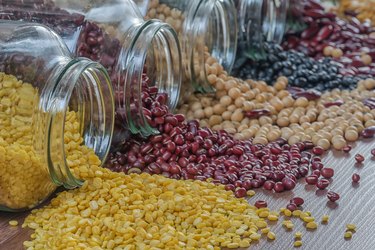
Fiber is an important nutrient that you are probably lacking in your diet. While other nutrients are important to supply your body with energy, fiber helps remove waste, excessive nutrients and water from your body. Edema is fluid retained in body tissues, such as fat. Edema can have many causes, ranging between overconsumption of salt to organ failure. Fluid retention due to alcohol or salt can be reduced by eating high-fiber food or by taking a fiber supplement. If fluid retention persists, or is accompanied by other symptoms, see a doctor for medical diagnosis.
Fiber
Video of the Day
Your body does not digest fiber, and thus it passes intact through your intestines. According MayoClinic.com, the daily recommendation for fiber is 38 g for men and 25 g for women; If you are over 50, men only need 30 g of fiber per day, and women 21 g. Eating enough fiber can improve your colon health, aid in weight loss, lower cholesterol and blood sugar, decrease cardiovascular disease risk and normalize bowel movements. Eating enough fiber will also help remove excess body water, as fiber absorbs a large amount of water as it passes through your intestines.
Video of the Day
Fluid Retention
When retained, fluid is stored in the interstitial space — the space between cells — and in body fat. With mild fluid retention, you may notice your ankles and the back of your hands have a puffy appearance. You may also have a full feeling and have difficulty bending over, especially if you have a large amount of fat around your midsection. Fluid retention can be caused by overconsumption of salt or alcohol. If fluid retention persists or worsens, see a doctor, as it may be a sign of an underlying medical condition.
High Fiber Foods
Whole grains, nuts, seeds, beans, legumes, fruits and vegetables are rich sources of fiber. If these foods are processed, they likely contain less fiber. MayoClinic.com recommends choosing a high-fiber cereal and whole-grain bread in order to increase your daily fiber intake. Eat fruits or vegetables with every meal. Try adding whole-grain flour to your baked goods or beans to your salad in order to vary your meals and increase your fiber intake.
Fiber Supplements
Although it should not make up a significant part of your daily fiber intake, a fiber supplement, such as psyllium, can give you the needed boost when you have fluid retention. Psyllium husks are high in fiber and swell up into a gel, absorbing extra water and easing bowel movements. Mix one to two tsp. of fiber supplement with a glass of water and drink immediately. Continue to drink water regularly to prevent the fiber from clumping or causing discomfort. Fiber supplements should not be taken with medication, as they will decrease the amount absorbed by your body.